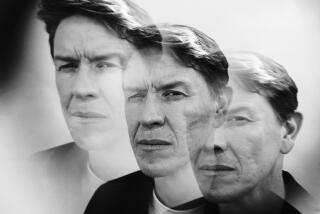Book Review : Oppressed Characters
The Blue Man and Other Stories by Adolf Muschg (George Braziller) translated from German by Marlis Zeller Cambon and Michael Hamburger: $12.95
A mountain is nature’s way of crowding an extra amount of surface into a limited space.
I once knew, but have forgotten, how big Switzerland would be if somebody applied a steam iron to it. Not as big as Russia, I’m sure, but considerable.
The Swiss writers of our time--Frisch, Duerrenmatt, Adolf Muschg--tend to operate on the mountain principle. Into a deceptive terseness they pack heavily populated continents. Their apparently quite matter-of-factness is as alarming as the dog that doesn’t bark or the clock that suddenly stops ticking.
The more surface the steeper, of course; and the harder to get around. There is a sense of effort for the characters that these writers create. Life is vicious for them. The theme is that of the enclosed society with too much history and too little movement; and lacking even the venting mechanism for accumulated passions provided elsewhere in Europe by war.
For Durrenmatt, especially, and in these short stories by Muschg, the characters are oppressed and dwindled by a festering accumulation in locked closets. The artistic impulse is not to burst open the closet but to measure the painful constriction and the warped steps of those who must creep past them.
Exploding Dynamite
In “Brami’s View,” the best of the seven stories in this collection, there is indeed a bursting, but it is more inward than outward. The narrator’s great-uncle, a powerful ox-like farmer with a ghost of humor about him, puts a stick of dynamite in his mouth one quiet afternoon and blows himself all over the bedroom.
It is an act of release, the narrator reflects. In his own deprived and obscured life, he has found no such gesture. He is not capable of it. But “it is this point, the point of absolute honesty, around which the earth must be turned if that for which it was created is to be fulfilled.”
All very well; but what is the stagnant despair for which such an action is a release? In the other stories, Muschg lets us sense it to a greater or lesser degree, but nowhere as successfully as here.
With much art and a few strokes he sketches Brami, the sturdy violent Obernland peasant. He has worked his land steadily, day in and day out. One day he is pale with fatigue. Why doesn’t he lie in for once, his wife suggests, while she and the girls go to the fields? It is a totally unexpected notion, one to be welcomed, as if life could, in fact, change.
But if life can be changed, it can be questioned. Standing by the window watching his family disappear into the fields, Brami is undone. What was this life he was resting from? His life consisted of working every day. It did not stay behind with him. It disappeared into the fields with his wife and daughters. It abandoned him. Muschg’s characters are an underclass. Their deprivations--poverty, a family tragedy, an ancient feud or fear--never redeem. They deform, in the same way that iodine deprivation will produce a goiter.
In “The Scythehand,” the narrator is a reclusive farmer who has retreated to live on a remote homestead after his house burned down with his son inside. He lives, shunned for his misfortunes and for a hideous facial twitch, with two sickly and feeble-minded daughters. He has been arrested for incest with both of them.
His narration is a plea to the court. It is numb, despairing, half-mad and imbued with an odd dignity. Life is monstrous, and within that monstrosity, he asserts, he brought a measure of comfort to his two daughters.
The title story is narrated by a man who has been tormented from childhood by a fear of poverty. He has worked his way up to a little prosperity by becoming an accountant and marrying. On a vacation in Spain, a musician comes to the couple’s table. He says something to the narrator’s wife; when he asks what it was, she won’t tell him. Later, she leaves him, and his life falls apart. For the narrator, there is no sequence of causes; there is only fate: retribution in the form of the blue-suited musician.
In some of the stories, Muschg produces a sense of alienation by a common literary shortcut. It is the author’s distance from his characters and his treatment of them as futile and absurd that does the trick; but it is only a trick. It is alienation on the cheap.
But in the best of the stories--the ones I have cited, there is an imaginative sympathy that takes us astonishingly far into these contorted and deprived souls.


